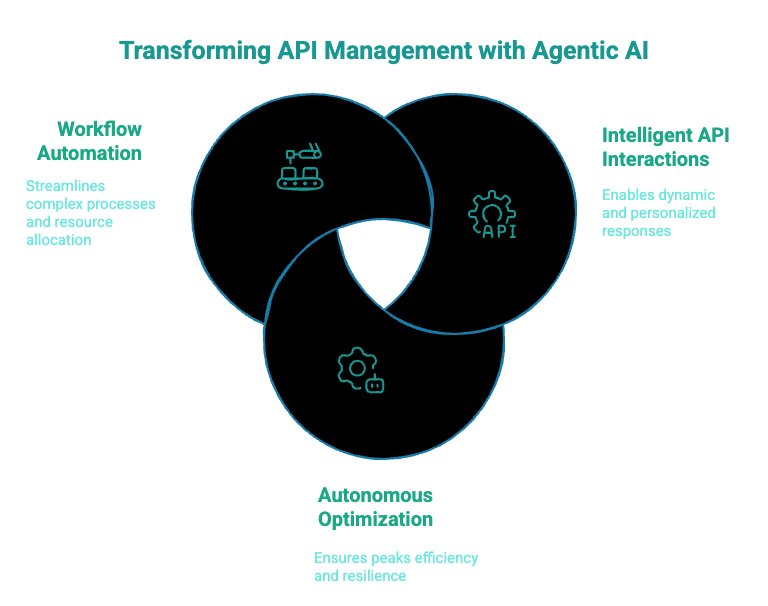The world of artificial intelligence is undergoing a seismic shift, with the emergence of agentic AI redefining the landscape of API development and management. As businesses and developers navigate the complexities of digital transformation, understanding the implications of this groundbreaking technology becomes paramount.
Agentic AI represents a significant departure from traditional, static AI models, introducing autonomous, goal-oriented agents capable of interpreting context, making adaptive decisions, and driving outcomes in real-time. This paradigm shift is poised to revolutionize the way APIs are designed, developed, and managed, unlocking new frontiers of efficiency, personalization, and innovation.
In this article, we'll dive into the transformative potential of agentic AI in the realm of APIs, exploring its core capabilities, impact on API development and management, and the far-reaching benefits it offers to businesses and developers alike. As we unravel the intricacies of this cutting-edge technology, we'll also examine the strategic implications for API governance, the evolving competitive landscape, and the steps organizations must take to harness the full potential of agentic AI in their API ecosystems.
Defining agentic AI: From static models to dynamic agents
The evolution from passive AI models to autonomous, goal-oriented agents marks a significant leap forward in the field of artificial intelligence. Agentic AI systems possess the ability to interpret context, make adaptive decisions, and exhibit goal-driven behavior, setting them apart from their static counterparts.
At the core of agentic AI lies a powerful combination of natural language understanding, reasoning, and real-time decision-making capabilities. These dynamic agents can comprehend and respond to complex queries, analyze vast amounts of data, and autonomously determine the most effective course of action to achieve desired outcomes.
The impact of agentic AI on API development and management
Enabling Intelligent and Adaptive API Interactions
Agentic AI transforms the way APIs interact with users and systems, enabling dynamic, contextual, and personalized responses. By leveraging the power of AI agents, APIs can intelligently interpret user intent, adapt to specific needs, and deliver tailored experiences in real-time.
Moreover, agentic AI can autonomously optimize API performance, security, and scalability, ensuring that APIs operate at peak efficiency and remain resilient in the face of evolving demands. This level of adaptability and self-optimization is particularly crucial in today's fast-paced digital landscape, where agility and responsiveness are key drivers of success.
Automating complex API workflows and orchestration
One of the most significant advantages of agentic AI in API management is its ability to automate complex workflows and orchestrate multi-step processes. AI agents can autonomously manage intricate API workflows, dynamically routing requests based on context and priority, and proactively detecting and resolving issues to ensure optimal reliability.
This automation not only streamlines API development and management but also frees up valuable time and resources for developers to focus on higher-level tasks and innovation. By offloading repetitive and time-consuming tasks to AI agents, organizations can accelerate their API development cycles and deliver value to their customers more efficiently.

Benefits of integrating agentic AI into API development
The integration of agentic AI into API development brings forth a host of benefits that empower businesses and developers to achieve new levels of efficiency, innovation, and customer satisfaction.
Improved efficiency and accuracy: Agentic AI enhances the speed and accuracy of API creation, leveraging intelligent algorithms to automate tasks, minimize errors, and optimize performance.
Enhanced developer experience: AI-driven tooling and assistive technologies streamline the developer workflow, providing intelligent suggestions, code completion, and real-time error detection, ultimately boosting productivity and reducing development time.
Scalability and adaptability: With agentic AI, APIs can dynamically scale and adapt to changing demands, ensuring optimal performance and reliability even in the face of fluctuating workloads and evolving requirements.
Implications for API strategy and governance
The rise of agentic AI necessitates a reevaluation of API strategies and governance frameworks to effectively harness its potential while addressing ethical, security, and accountability concerns.
Organizations must adapt their API strategies to incorporate agentic AI, prioritizing transparency, explainability, and human oversight in the design and deployment of AI-driven APIs. This involves establishing clear guidelines for data privacy, security, and ethical considerations, ensuring that AI agents operate within well-defined boundaries and align with organizational values.
Furthermore, API governance frameworks must evolve to accommodate the unique challenges posed by agentic AI, such as monitoring and auditing AI decision-making processes, ensuring compliance with relevant regulations, and maintaining accountability for the actions of AI agents.
Preparing for the agentic AI revolution in API ecosystems
Organizations aiming to stay competitive must prioritize the development of infrastructure that seamlessly integrates AI capabilities into their API ecosystems. This involves selecting advanced platforms designed to accommodate the complexities of agentic AI, ensuring that systems can evolve alongside technological advancements. By embedding AI capabilities directly into the core of API systems, businesses can achieve unprecedented levels of adaptability and intelligence.
To ensure reliability, it's crucial to establish advanced evaluation frameworks that assess both the performance and decision-making accuracy of AI-driven systems. These frameworks should incorporate metrics tailored to the unique characteristics of AI, allowing for comprehensive analysis and optimization. Additionally, creating a resilient operational environment involves implementing robust security protocols that address potential AI-specific vulnerabilities, safeguarding data integrity while promoting trust in AI-powered interactions.
Cultivating an AI-fluent API workforce
The shift towards agentic AI necessitates a workforce adept in the latest AI and API technologies. Providing continuous education and training programs in cutting-edge AI methodologies will empower employees to effectively leverage AI innovations, driving growth and efficiency. Comprehensive training should encompass not only technical skills but also the implications of AI on business strategy and development processes.
Fostering a collaborative culture is key to unlocking the full potential of agentic AI. Encouraging interdisciplinary collaboration among developers, AI specialists, and business leaders can lead to holistic solutions that address complex challenges with creativity and precision. By fostering an environment that values innovation and continuous exploration, organizations can motivate teams to push the boundaries of what's possible with agentic AI, ultimately leading to breakthroughs that redefine the API landscape.
Competitive landscape: Agentic AI innovators and pioneers
The competitive landscape of agentic AI in API management is shaped by the efforts of major cloud providers, specialized startups, and early adopters pushing the boundaries of what's possible with AI-driven APIs.
Prominent cloud platforms are spearheading the integration of advanced AI capabilities into their services. By leveraging their expansive infrastructure, these platforms enable the deployment of intelligent APIs that can intuitively adapt to changing conditions. Their comprehensive solutions offer businesses the flexibility to enhance operational efficiency and scalability, ensuring robust support for dynamic user interactions.
Innovation driven by specialized startups
A new wave of startups is making significant strides in AI-driven API management, each focusing on distinct industry challenges. These innovative companies are exploring cutting-edge technologies and methodologies, providing tailored solutions that address specific needs. Their focus on novel approaches to API security, performance, and contextual interaction is driving the evolution of agentic AI capabilities, contributing significantly to the field's growth.
Pioneering applications by early adopters
Several pioneering organizations are harnessing agentic AI to transform their API strategies, showcasing its potential through tangible applications. These trailblazers, spanning diverse sectors, are leveraging AI to achieve enhanced operational outcomes and personalized user experiences. Their successful implementations demonstrate the profound impact of agentic AI, serving as valuable examples of its transformative power in revolutionizing traditional API practices.
Charting the future: Agentic AI's long-term potential for API innovation
As the digital landscape evolves, agentic AI is set to usher in a new era of adaptive API ecosystems that continuously enhance their own performance. These systems will leverage advanced predictive analytics to anticipate and resolve potential issues before they impact functionality, ensuring seamless operations. By integrating sophisticated algorithms, APIs will dynamically adjust to variations in demand and environmental conditions, fostering an environment of perpetual improvement and resilience.
The potential for collaboration among AI agents within these ecosystems introduces innovative avenues for API functionality. AI agents will employ advanced communication protocols to synchronize their efforts, facilitating complex interactions across diverse platforms. This cooperative framework will enable APIs to function more holistically, coordinating tasks and optimizing processes across interconnected networks, thereby maximizing efficiency and effectiveness.
Incorporating agentic AI into blockchain and edge computing frameworks may redefine how data is processed and secured across distributed systems. Blockchain's immutable ledger offers a secure foundation for transactions, enhancing trust and reliability in AI-driven interactions. Concurrently, edge computing will enable real-time data processing at the source, reducing latency and enhancing the responsiveness of AI applications. This integration will empower new applications in fields like IoT and smart cities, where real-time processing and security are paramount.
Embracing the agentic AI era: A call to action for API leaders
API leaders find themselves at a strategic inflection point, where adopting agentic AI technologies can unlock transformative potential and drive competitive growth. The capabilities of agentic AI necessitate a forward-thinking approach, urging leaders to delve deeply into cutting-edge technologies that redefine API functionalities. Embracing this change involves integrating advanced AI solutions and nurturing an organizational ethos open to technological evolution and agile in its response to emerging opportunities.
Fostering industry collaboration and insight-driven partnerships
To successfully navigate the agentic AI landscape, fostering collaboration with industry peers and engaging with standard-setting bodies becomes essential. API leaders can benefit from participating in forums and consortiums that offer insight into industry best practices, regulatory shifts, and technological innovations that are shaping the future of API ecosystems. Aligning organizational strategies with these insights ensures compliance and enhances interoperability across diverse technological landscapes.
Additionally, forming insight-driven partnerships with technology innovators and research institutions provides access to pioneering developments and breakthroughs. These partnerships enable organizations to integrate AI capabilities with precision, leveraging expert insights to streamline implementation and optimize outcomes. Establishing these collaborations is crucial for creating resilient, forward-looking API ecosystems that fully harness the benefits of agentic AI.
Embracing a culture of innovation and agility
Promoting a culture of innovation is key to effectively integrating agentic AI. API leaders should foster an environment where experimentation is encouraged, allowing teams to explore innovative approaches, pilot new technologies, and iterate rapidly on solutions. This iterative process empowers organizations to continually refine their AI strategies, adapting swiftly to technological advancements and market fluctuations.
Prioritizing agility and continuous learning ensures that organizations remain leaders in innovation. By cultivating an environment that values creative exploration and welcomes change, API leaders can drive sustained development and maintain resilience in the face of technological disruption. Encouraging a mindset centered on adaptability not only equips organizations to tackle current challenges but also positions them to capitalize on future opportunities in the expanding digital landscape.
FAQs
What is agentic AI, and how does it relate to APIs?
Agentic AI represents a new class of intelligent systems that operate independently, using sophisticated algorithms to make decisions and execute tasks without direct human control. Within the API context, this technology facilitates the creation of interfaces that can adapt dynamically to changing inputs, enabling more context-aware and efficient interactions. By embedding agentic AI, APIs transition into autonomous entities capable of complex data processing and decision-making.
With the advent of agentic AI, API management practices are evolving to incorporate advanced automation and contextual intelligence. This transformation allows APIs to autonomously manage operational parameters such as load balancing and security postures, ensuring a seamless user experience. The integration of AI-driven insights enhances the ability of APIs to self-regulate and optimize their performance continuously.
What are the benefits of integrating agentic AI into API development?
By embedding agentic AI into API development, organizations can achieve significant improvements in both efficiency and responsiveness. APIs gain the ability to process and react to inputs in real time, tailoring their responses to meet specific user needs effectively. Furthermore, the scalability of AI-enhanced APIs ensures they remain robust and adaptable across varying operational demands.
What challenges do organizations face when adopting agentic AI for APIs?
The integration of agentic AI into existing systems presents several hurdles, particularly in terms of technical alignment and regulatory compliance. Organizations need to carefully navigate the complexities of AI implementation to ensure seamless integration with current infrastructures. Additionally, establishing comprehensive governance structures is vital to maintain ethical standards and accountability in AI operations.
How can businesses leverage agentic AI to improve their API strategies?
Businesses can harness the power of agentic AI to refine their API strategies by automating complex workflows and enhancing operational precision. This technology enables proactive adjustments to API functionalities based on predictive analytics, aligning service offerings with evolving market needs. Encouraging continuous innovation and adaptation ensures businesses maintain a competitive edge in the rapidly advancing digital landscape.
Conclusion
Agentic AI is redefining the framework of API ecosystems, introducing advanced capabilities that enhance the way APIs are conceptualized and executed. This innovation brings a new level of sophistication, enabling systems to interact with an intuitive understanding of user needs and environmental variables. By leveraging sophisticated algorithms, APIs are evolving into entities capable of delivering high-context, real-time responses that drive efficiency and user satisfaction.
The introduction of agentic AI into API strategies enriches the development process by providing robust analytical tools that empower developers to push the boundaries of what's possible. These intelligent systems are not merely automating tasks; they're enhancing the creative potential of developers by facilitating a deeper focus on innovation and strategic design. AI-driven platforms offer predictive insights and real-time monitoring, ensuring that APIs operate at the pinnacle of performance without compromising security or reliability.
For forward-thinking organizations, embracing agentic AI represents a commitment to pioneering technological frontiers and maintaining a competitive edge. The ability to dynamically adjust to market trends and user expectations with precision reflects a strategic advantage that sets industry leaders apart. As agentic AI continues to mature, businesses positioned to adapt and integrate these technologies will lead the charge in a new era of digital transformation, characterized by intelligent systems and seamless user experiences.
As the API landscape continues to evolve at an unprecedented pace, staying informed about the latest developments in agentic AI is crucial. By actively participating in industry events, engaging with thought leaders, and exploring cutting-edge research, you can position your organization at the forefront of the agentic AI revolution.
To learn more about how we can help you harness the power of agentic AI for your API ecosystem, request a demo to explore Kong's API platform capabilities and let us guide you on this transformative journey.









